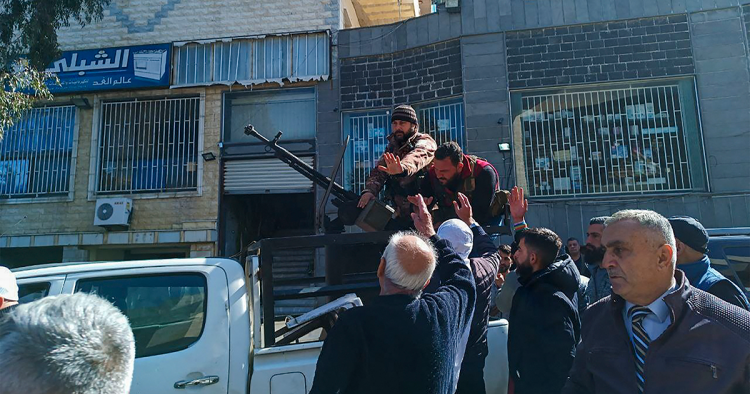In recent weeks, the southern Syrian province of Sweida has seen a series of kidnappings targeting regime military officers. Unlike the financially motivated incidents common in the region, these abductions, which occurred on April 2 and 25, stand out because they targeted individuals based on their affiliation with the regime of Bashar al-Assad rather than their personal identities. Reports suggest that Sweida residents orchestrated the abductions as a way of negotiating the release of relatives detained by the regime.
The prevalent use of detention by regime forces to extort money has eroded citizens' trust in their ability to secure the detainees’ release through the judicial system. Consequently, communities have resorted to vigilante justice to shield themselves from state-sponsored violations, particularly in regions where the regime's authority is weak, such as Sweida. These acts underscore that Assad's regime is not seen as a legitimate governing entity whose authority should be recognized but rather as an adversary that can be challenged when necessary.
On April 2, Sweida residents abducted three regime military officers at a checkpoint they established at al-Ankoud roundabout, retaliating for the regime's arrest of Samer Kamal Zain al-Din and others the previous day. Similarly, on April 25, locals kidnapped several regime military officers in the governorate, including a colonel, in response to the detention of a university student from Sweida two weeks earlier in Latakia due to a Facebook post.
However, these incidents are just two examples of what has become a much broader trend over the past several years. According to sources within regime areas, it has become common for locals to retaliate against the regime's arrests or forced disappearances of community members by kidnapping military or security officers.
Upon confirming pro-regime forces' involvement in the disappearances or detentions, relatives of the victims set up mobile checkpoints within the city or on main roads to capture security or military officials and use them as leverage. However, the exact number of such abductions remains unclear due to the secrecy surrounding them. Many incidents apparently go unreported in local media to avoid attracting unwanted attention.
Sweida residents have, at times, also succeeded in securing the release of relatives by merely threatening violence against regime forces. However, the effectiveness of such actions usually depends on the ability of locals to mobilize sufficient armed groups to send a compelling message that forces submission. This tactic was exemplified in the case of Sheikh Abu Hatem, who was released last year from a Damascus prison after armed factions in Sweida threatened escalation unless he was freed.
Open source data indicates that these street justice-like practices are not widespread across all regime-held areas but are more concentrated in territories with delicate power dynamics between the government and local communities, such as Sweida and Daraa.
Despite undermining its authority, the regime typically opts to negotiate with kidnappers to avoid disrupting the fragile status quo in these regions. For example, in Sweida, the regime has refrained from direct confrontations with the residents behind the kidnappings due to strong social and religious ties, including with local armed factions. Hence, retaliatory actions risk further alienating Sweida’s Druze communities, potentially turning them against the regime.
Negotiations in such cases are often initiated by the local kidnappers once they have secured enough hostages from the regime. They typically appoint a mediator to broker a swap deal with the relevant government security agency, eventually leading to the release of all detainees. These mediators are usually prominent local figures, such as community and religious leaders, businessmen, or commanders of local armed groups, who have connections with government officials. For example, negotiations following the April 2 abduction of regime officers were facilitated by the Men of Dignity Movement, a local Druze faction in Sweida, acting on behalf of the kidnappers.
The length of these negotiations varies depending on where people are arrested and by which branch of the government security apparatus. It's worth noting that finalizing a deal is swifter if the individual detained is held locally or by the same security branch involved in the talks. For instance, the abduction of regime military officers on April 2 resulted in the swift release of the residents detained because they were apprehended en route to Damascus.
Once an agreement is reached, the abductors typically release the detained officers promptly as a goodwill gesture. For instance, regime officials detained on April 25 were released the same day after a prisoner swap deal was successfully reached with the regime. However, the student detained in Latakia was only released on April 28. This delay is likely due to the involvement of various intermediaries and security agencies, as well as slow bureaucracy caused by the long distance between where he was detained and Sweida.
The persistence of state-sponsored detention and extortion schemes and the absence of an independent judicial system to hold military and security forces accountable suggest that the practice of kidnapping regime officers for self-protection is likely to persist for the foreseeable future. This is primarily because these actions have proven successful in securing the prompt release of detainees from the regime without eliciting any retaliatory response.
In simple terms, while the expansion of Assad’s territorial control in recent years may have enhanced the power trajectory of his armed forces, it has failed to increase the legitimacy of his regime, even in the eyes of those who live under its rule.
Dr. Haid Haid is a Syrian columnist and a consulting fellow with the Middle East and North Africa program at Chatham House.
Photo by SUWAYDA 24/AFP
The Middle East Institute (MEI) is an independent, non-partisan, non-for-profit, educational organization. It does not engage in advocacy and its scholars’ opinions are their own. MEI welcomes financial donations, but retains sole editorial control over its work and its publications reflect only the authors’ views. For a listing of MEI donors, please click here.













